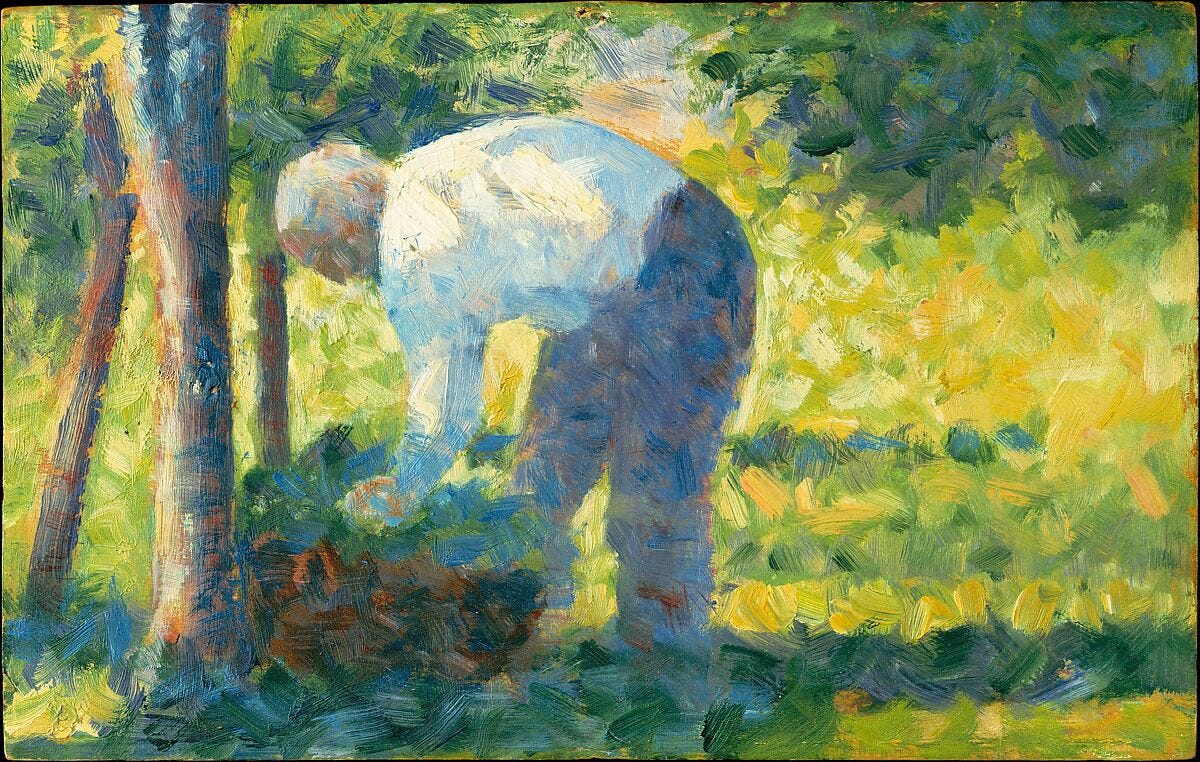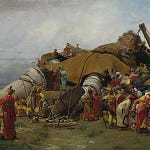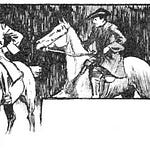Dear Readers, don’t pass this one by because you think it’s about a flower like those that Wordsworth saw by the thousands on the coast of a Cornish bay! As we have done before here, we visit a work by George Herbert, whom I rank as the greatest meditator on the Christian life in all of English lyric poetry.
Debra and I and our daughter Jessica plant gardens wherever we go. It’s in our nature. When we lived in the city of Providence for six years, we had a small fenced-in back yard, an eight-by-four-foot plot by the front porch, and a narrow strip on our shady side between our sidewalk and the neighbor’s. We put in flowers wherever we could, I built an arbor as an “entry” to the back yard, and when the city decided to plant elm trees along our street in front of the houses, Debra asked me to build a little square picket fence around ours, to protect it from cars (and sure enough, somebody did ram the fence but missed the tree because of it). Many years later, we see that ours was the only tree that survived on the whole block.
"My love is a garden enclosed,” says the Bridegroom in the Song of Songs, and that’s an image of Paradise — and by the way, our word paradise comes from the Romans, who got it from the Greeks, who got it from the Persians; yes, it’s an ancient Persian word. Remember, though, that Persian is in our big family of languages; a distant cousin of English, and no cousin at all of Hebrew or Arabic. Anyway, the word itself refers to such a garden, enclosed, protected. But here we are, frail and faulty human beings, longing for Paradise, when half the time we’re trying to raise some distant image of a paradise here in this life, and the other half the time we’re tearing down what we’ve done.
But as Herbert’s poem reminds us, we’re not the ultimate gardeners. God is. We instead are like flowers in the garden. But what does that suggest, here, now? Flowers do not always bloom. Some flowers, like lilies or tulips, seem to die all the way back down into the ground after they’ve bloomed, living still but quietly, in a sort of suspended state, in the bulbs under the earth. Flowers are subject to cold and heat and storms. They need water, they need sunlight, they need — we need the tending hand of God. So then, Herbert compares his life with that of a flower, but it’s by no means an easy life. The hand of God works wonders, killing and bringing again to life, leading the soul through its joy and its sadness, through periods of sweetness and of drought, teaching us throughout these times that, as the poet says, “we are but flowers that glide.” Indeed, all the great writers on the spiritual life agree that those times of drought are when the soul can grow most strong; patience is all. The poem ends with a promise and a warning. If we “would be more,” that is, if we pretend that we are not just flowers that pass away, if we are “swelling through store,” meaning that we are swelling with pride because we think we enjoy a perfect abundance of all that life can give, we forfeit our place in the true and only Paradise.
How Fresh, O Lord, how sweet and clean
Are thy returns! even as the flowers in spring,
To which, besides their own demesne,
The late-past frosts tributes of pleasure bring.
Grief melts away
Like snow in May,
As if there were no such cold thing.
Who would have thought my shriveled heart
Could have recovered greenness? It was gone
Quite under ground, as flowers depart
To see their mother-root, when they have blown;
Where they together
All the hard weather,
Dead to the world, keep house unknown.
These are thy wonders, Lord of power,
Killing and quickening, bringing down to hell
And up to heaven in an hour;
Making a chiming of a passing-bell.
We say amiss,
This or that is:
Thy word is all, if we could spell.
O that I once past changing were;
Fast in thy Paradise, where no flower can wither!
Many a spring I shoot up fair,
Offering at heaven, growing and groaning thither:
Nor doth my flower
Want a spring-shower,
My sins and I joining together.
But while I grow to a straight line,
Still upwards bent, as if heaven were mine own,
Thy anger comes, and I decline.
What frost to that? what pole is not the zone
Where all things burn,
When thou dost turn,
And the least frown of thine is shown?
And now in age I bud again,
After so many deaths I live and write;
I once more smell the dew and rain,
And relish versing: O my only light,
It cannot be
That I am he
On whom thy tempests fell all night.
These are thy wonders, Lord of love,
To make us see we are but flowers that glide:
Which when we once can find and prove,
Thou hast a garden for us, where to bide.
Who would be more,
Swelling through store,
Forfeit their Paradise by their pride.
Note: Our full archive of over 1,000 posts, videos, audios is available on demand to paid subscribers. We know that not everyone has time every day for a read and a listen. So we have built the archive with our readers in mind. Free subscribers have access to a good number of our most recent posts. Please do browse, and please do share posts that you like with others.
Listen to this episode with a 7-day free trial
Subscribe to Word & Song by Anthony Esolen to listen to this post and get 7 days of free access to the full post archives.












